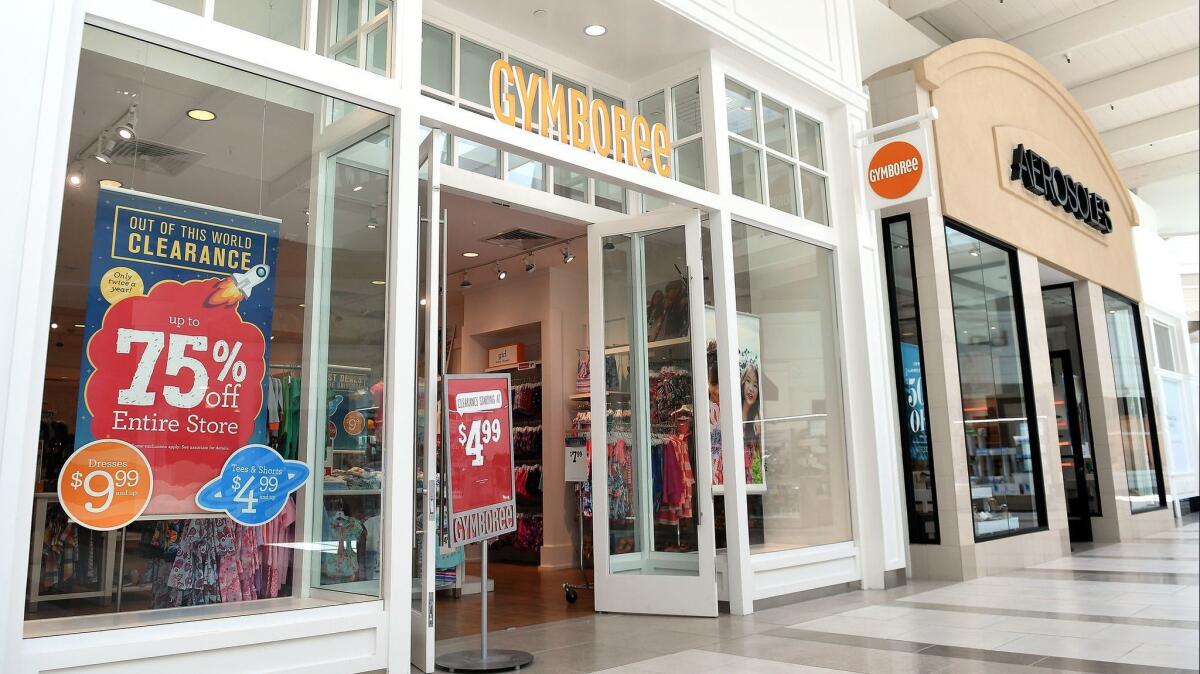Gymboree, Crazy 8 chains to shut down after retailer files for bankruptcy a second time

- Share via
Gymboree Group Inc. will shut down its Gymboree and Crazy 8 clothing chains after declaring bankruptcy for a second time and failing to find a buyer for the stores, which have been hit hard by a decline in mall traffic.
The San Francisco-based company filed for Chapter 11 bankruptcy protection on Wednesday, less than a year and a half after it emerged from an earlier reorganization that cut debt and overhauled operations.
The company, which operates 945 stores under three brands, said its upscale Janie and Jack stores would remain in business as it sought to find a buyer for them. The company owes creditors about $212 million, and some 10,000 people could lose their jobs.
Gymboree will join Toys R Us Inc., Shopko Stores and Bon-Ton Stores Inc. in the ranks of retailers that collapsed as shoppers deserted malls and bought online.
“We are saddened and highly disappointed that we must move ahead with a wind-down of the Gymboree and Crazy 8 businesses,” Chief Executive Shaz Kahng, appointed in November, said in a statement.
The bankruptcy filing does not include some 800 Gymboree Play & Music stores in the United States and overseas. The chain, which offers indoor play areas and classes for children, was spun off from Gymboree Group in 2016, a spokeswoman said in an email.
An auction of Gymboree Group company assets is expected by Feb. 25, and going-out-of-business sales are being planned to dispose of inventory and raise about $155 million, said Stephen Coulombe, chief restructuring officer, in court papers. The company expects the sales and store closings to continue through April.
The bankruptcy comes at a time of continuing weakness for the children’s apparel industry, with sales at children’s and infant-wear stores falling 5.8% in November and 5.9% in December, according to First Data.
Gymboree was acquired by Bain Capital for about $1.8 billion in 2010. The private equity buyout saddled the company with more than $1 billion in debt, leading Gymboree to cut costs and defer investments before filing for court protection in June 2017. It emerged with less debt and fewer stores.
But competition in the industry is robust from rivals such as Children’s Place, the Gap, discount stores, internet retailers and big-box retailers that sell clothing at cheaper prices. Margins shrank, and Gymboree’s net retail sales dropped 27% to $573 million during the nine months that ended Nov. 3, court documents show.
“The decline in revenue and rise in merchandising costs outpaced Gymboree’s ability to reduce its fixed cost structure composed largely of store rent, labor costs, and corporate general and administrative expense,” court documents show.
The staff includes 10,100 full- and part-time workers, with the vast majority — 9,600 — hourly workers, according to filings. Gymboree said the $212 million in total obligations included $79.1 million under a senior secured credit facility, $44.5 million of outstanding letters of credit and about $89 million under its senior secured term loan.
Special Situations Investing Group, a lending-and-investment affiliate of Goldman Sachs, is serving as the stalking-horse bidder in a court-supervised sale process for Janie and Jack, which bills itself as selling “classic, designer clothing in rich fabric, design and detail.”
In comparison, Crazy 8 sold trendy clothing at a lower price point, while the Gymboree branded stores occupied the middle of the value chain.
More to Read
Inside the business of entertainment
The Wide Shot brings you news, analysis and insights on everything from streaming wars to production — and what it all means for the future.
You may occasionally receive promotional content from the Los Angeles Times.










